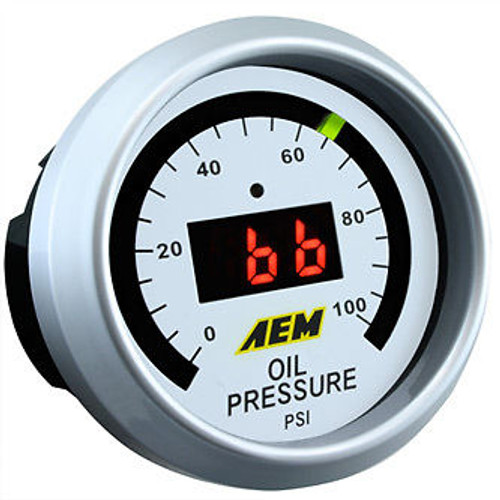Product Description
AEM’s legendary Digital Wideband O2 AFR UEGO Gauge is a wideband UEGO air/fuel ratio controller (AFR) and gauge in one. It unites accuracy, speed and control with an easy to read, digital LED display and sweeping LED “needle” that changes colors as AFR changes from rich to lean.
NOTE: The 30-4100 Wideband UEGO Gauge Controller that uses the Bosch 4.2 LSU sensor has been superseded to the 30-4110 Wideband UEGO Gauge Controller that uses the Bosch 4.9 LSU sensor. The 30-4110 Wideband Controller Gauge is cosmetically identical to the 30-4100. Instructions for the 30-4100 are still available in the Instructions tab.
WHAT IS A WIDEBAND UEGO AIR/FUEL CONTROLLER?
AEM's Wideband UEGO (Universal Exhaust Gas Oxygen, pronounced “You-Way-Go”) Controllers are powerful, cost effective tuning tools that allow users to accurately monitor the Air/Fuel Ratio (AFR) of their engine.
WHY USE A WIDEBAND AIR/FUEL CONTROLLER?
Accurate AFR data is critical when tuning an engine. Running rich (very low air/fuel ratio, excessive fuel) can cause a loss in power, while running too lean (very high air/fuel ratio, not enough fuel) may result in serious engine damage. Using a wideband air/fuel controller during the tuning process allows you to monitor AFR and adjust tuning parameters to optimize them for maximum power and efficiency. AEM has a comprehensive line of highly accurate, reliable wideband air/fuel controllers that can help ensure your vehicle is optimally tuned.
WHAT IS FREE-AIR CALIBRATION?
Some of our competitors require that you frequently perform a free-air calibration procedure to calibrate their O2 sensors. This process involves removing the sensor from the bung while still connected to the controller device, then waving the sensor in the air so it can read atmospheric O2 levels. We use Bosch 4.9 LSU sensors in our wideband controllers. Our sensors are individually laboratory-calibrated by Bosch and never require free air calibration!
CAN I CHANGE THE AEM UEGO SENSOR’S CONNECTOR?
No. There is a laser-etched, calibrated resistor in the sensor’s connector body. This resistor is specifically created for the exact sensor that it is attached to. Modifying this will invalidate the sensor’s output.









